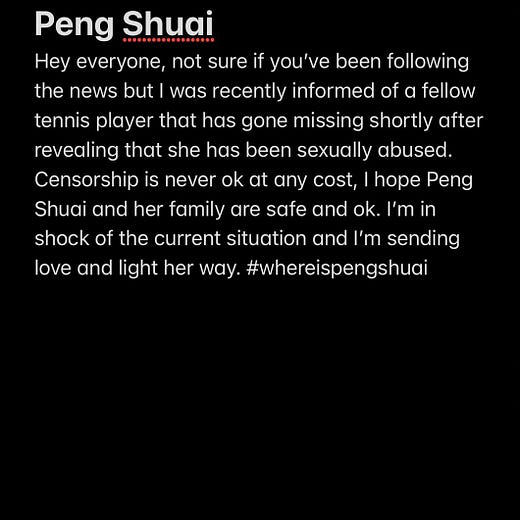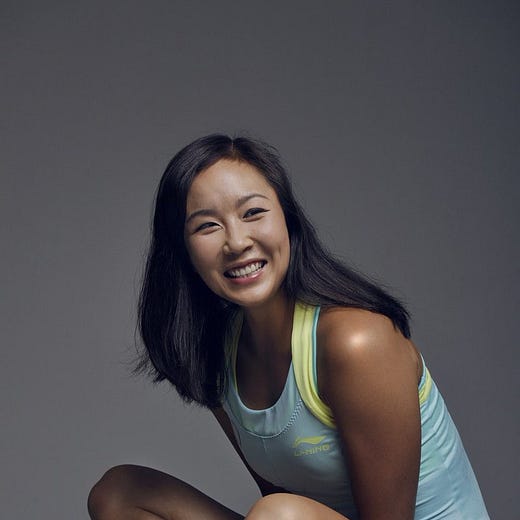Olympic sponsors stay silent on Peng Shuai
On November 2, Peng Shuai, a Chinese professional tennis player who was once ranked #1 in the world in doubles, accused a powerful Chinese politician, Zhang Gaoli, of rape. "I never consented that afternoon, crying all the time," Peng wrote. Later, Peng said, she was forced into an ongoing sexual relationship with Zhang.
Peng seemed keenly aware that her accusation would put her in danger. "[E]ven if it’s just me, like an egg hitting a rock, or a moth to the flame, courting self-destruction, I’ll tell the truth about you," she said in the message, which was posted on the Chinese social media site Weibo.
The post was scrubbed from Weibo, which is subject to censorship from the Chinese government, within minutes. Peng vanished from public view.
The incident occurred just three months before the start of the 2022 Winter Olympic Games in Beijing. The upcoming Olympics in China could provide leverage to secure the well-being of Peng Shuai. Instead, the International Olympic Committee (IOC) has engaged in "active collaboration with Chinese authorities in undermining freedom of speech and disregarding alleged sexual assault."
For two weeks after her Weibo post, Peng wasn't heard from at all. Then, on November 17, Chinese state media produced a statement in which Peng purportedly says she is "not missing" or "unsafe" and the "allegation of sexual assault" is "not true." It also attacks the Women's Tennis Association (WTA), which has been aggressively advocating for Peng and threatening to sever its ties with China until it can be certain of Peng's safety and freedom.
The IOC, in response to the message, said it was "encouraged by assurance that she is safe.” Nearly everyone else, including the WTA, rejected this message as unreliable and almost certainly not from Peng.
In an effort to end the controversy, Chinese state media published two images of Peng, one eating dinner and another watching a tennis match. But this effort also convinced few observers.
On November 21, the IOC released a statement saying its president, Thomas Bach, had participated in a 30-minute video chat with Peng and an IOC representative from China. The statement said that Peng "is safe and well, living at her home in Beijing." The IOC claimed that Peng "appeared to be relaxed" and was "doing fine."
Notably, the IOC's statement did not mention Peng's rape allegation. The IOC also did not release a video or transcript of the conversation itself. Nor did the IOC explain how the call was arranged when many others, including the WTA, have been unable to reach Peng. Instead, the IOC released a single image of Peng on the call, seated in front of a pile of stuffed animals.
The WTA responded by saying the IOC's statement about the call does not "alleviate or address the WTA's concern about [Peng's] well-being and ability to communicate without censorship or coercion." Human Rights Watch said that the IOC had "failed to adhere to its own human rights commitments and to protect the free expression rights of Olympic athletes." Human Rights Watch called on the IOC to "retract its statement regarding the video call" and publicly explain "the circumstances surrounding the call and the statement."
It's clear that Bach and the IOC are focused on not letting Peng's situation interfere with the 2022 Winter Olympics, which the IOC is counting on to generate revenue. But the IOC is not the only powerful entity involved with the Olympic Games. There are also more than a dozen corporate "partners" who are sponsoring the Olympics.
Money over everything
Tennis star Naomi Osaka has been outspoken in her advocacy for Peng. In a November 16 tweet, Osaka said "censorship is not OK at any cost." She used the hashtag #whereispengshuai, which has been adopted by supporters of Peng.
In June, Panasonic signed Osaka to an endorsement deal. Panasonic said it partnered with Osaka not only because of her tennis prowess but also because her values and stances on social issues "deeply resonate" with the company.
Ms. Osaka takes social issues seriously, looking beyond tennis to share her views on what a better society would look like in her own words. The founder of Panasonic, Konosuke Matsushita, held the notion that a stable state of happiness comes only when both mental stability and material prosperity are secured. Based on this idea, the company endeavors to create an ideal society where all of us can enjoy lives that are both mentally fulfilling and affluent in the material sense.
Panasonic is one of 13 corporate sponsors of the Olympic Games. Last week, the New York Times contacted Panasonic and asked if it had any comment on Peng's plight. Panasonic did not respond.
Panasonic is in good company. The New York Times contacted the other corporate sponsors and none provided any comment on Peng:
Airbnb
Alibaba
Allianz
Atos
Bridgestone
Coca-Cola
Intel
Omega
Procter & Gamble
Samsung
Toyota
Visa
These companies are taking the same approach as the IOC. They have invested millions of dollars in sponsoring the games. Most have other substantial economic investments in China. They are not going to let Peng — or broader issues of human rights — interfere with that.
One entity taking the opposite approach is the WTA.
The WTA has threatened to pull its tournaments out of China over Peng's treatment. "We continue to call for independent and verifiable proof that Peng Shuai is safe and that her sexual assault allegation will be investigated fully, fairly and without censorship. If not, the WTA is prepared to do what is right," WTA CEO Steve Simon said.
This is significant because China has been an important engine of growth for the WTA. In 2019, China hosted 9 WTA tournaments "with a total $30.4 million of prize money on offer." The season-ending WTA Finals, held in Shenzhen, had a total purse of $14 million. The WTA Finals was moved from Shenzhen the last two years due to COVID but is slated to return from 2022 to 2030.
CORRECTION (11/30): A representative from Dow tells Popular Information that, although the company is still listed as a sponsor on the Olympic website, Dow’s sponsorship ended in 2020. The article has been updated.









Thank you for helping make this a story beyond the tennis world. As an emblem of what is wrong with our society regarding putting profit over people, human rights abuses, and disregarding women's claims of sexual assault, rape, and abuse, this deserves to be amplified.
Of course the IOC doesn’t care, they probably all took cash for placing the Olympics in China to begin with. Time after time it is proven it’s all about $$$$. Thank you again for the work you do.